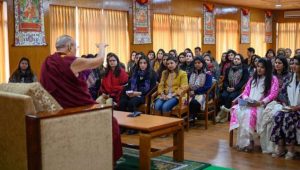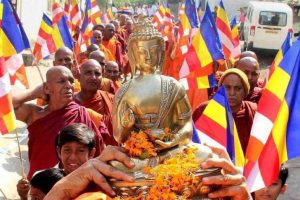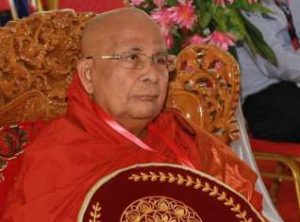
The Korean Seon (Zen) master Venerable Pomnyun Sunim (법륜스님) wears many hats: Buddhist monk, teacher, author, environmentalist, and social activist, to name a few. As a widely respected Dharma teacher and a tireless socially engaged activist in his native South Korea, Ven. Pomnyun Sunim has founded numerous Dharma-based organizations, initiatives, and projects that are active across the world. Among them, Jungto Society, a volunteer-based community founded on the Buddhist teachings and expressing equality, simple living, and sustainability, is dedicated to addressing modern social issues that lead to suffering, including environmental degradation, poverty, and conflict.
The following article shared by Jungto Society is part of a series of notable highlights from Ven. Pomnyun Sunim’s writings, teachings, and regular live-streamed Dharma Q+A sessions, which are accessible across the globe.

In the past, people aged 60 and up were considered to be senior citizens. Therefore, the retirement age was set at 60 years old. However, the 60-year-olds of today are as healthy as the 50-year-olds of a few decades ago. Since people are now healthier and have a longer life expectancy, it may be necessary to increase the retirement age by about 10 years. However, there is a condition. Since there is already a shortage of jobs, there will be fewer jobs for young people if the retirement age is pushed up, so job sharing is necessary.
For example, let’s say that someone is 58 years old and has reached the retirement age at his company and his monthly salary is $5,000. If the company were to raise the retirement age but were to continue to pay the same salary, it would have to bear a bigger financial burden and be unable to hire many new employees. Moreover, as employees become older, they acquire wisdom and experience but inevitably lag behind in their pace of work and technological expertise. In this case, it is possible for the company to continue to benefit from the experience and accumulated knowledge of the older employees by keeping them employed but at a lower position and salary. For example, if the person at retirement age is the head of a department, he could hand over his position to a junior employee and take on the role of an advisor or a member of the guidance committee, with a lower salary of $3,000. When he reaches 70, he could further reduce his work hours to only three days per week with a monthly salary of $2,000. This way the company can effectively utilize his skills and experience without too much financial burden.
As people grow older, they should let go of their stereotypes and preconceptions about different jobs. A person may work as a security guard after retiring from a position as the head of a department. When our society teaches that all occupations are equally valuable, people may respect an ex-CEO all the more when he retires and works as a security guard at the same company, and not look down on him. Likewise, a retired school principal, instead of idling his time away, may volunteer in assisting young teachers with class preparations or teach a class once a week. If we can distribute work appropriately, lowering the wages and work hours for certain positions, we can create a system which helps older workers to stay employed and to make some money without overworking themselves.
In today’s society, elderly people are treated as if they cannot do anything, but if you look around, there is plenty of work for them to do. In our Jungto practitioners’ community, we see that when young people make kimchi or bean paste, it lacks flavor, but when the older ladies make it, it is delicious. Since the physical labor that goes into making these foods is too taxing for the older practitioners, they can divide the work with the younger practitioners and work in harmony as a team. When young people do the heavy lifting and older people offer advice on combining the condiments or salting cabbages, the job can be completed in a very efficient manner.
Even on a farm, all the produce, such as lettuces and cabbages, seem to flourish in the hands of older people, but do not do so well under the care of younger people. Therefore, if the older people plant the seeds and tend to the crops while the younger people undertake the more laborious tasks, they can achieve harmony. When people can work in this way, even people in their eighties are able to play a significant role.
If you travel to the countryside, you will see old men working like strong young men. When people are young, working in the city looks sophisticated while farming in the countryside seems outdated. However, those who work in the city are forced to retire at a relatively young age, while there is no such thing as retirement for farmers even if they reach their seventies. Farmers can keep working for as long as they are able to. Therefore, instead of relying on their children in their old age, they are able to send their children the produce they farmed even in their eighties.
As people grow older, they remain vibrant when they keep active and stay useful. Older people in poor and destitute countries who have to keep working have eyes that are full of life, whereas those of people in the US, for example, who sit leisurely on park benches or rocking chairs do not have the same vigor and liveliness. Living in physical comfort with nothing much to do is not necessarily a good thing. Rather, it is beneficial for the mind and body to stay active, whether it is by weeding in the fields or cleaning the house or doing volunteer work.
See more
Pomnyun
Jungto Society
JTS Korea
JTS America
International Network of Engaged Buddhists
Related videos from BDG
Dharma Q+A with Ven. Pomnyun Sunim
Wisdom Notes from Ven. Pomnyun Sunim
Related features from BDG
Engaged Buddhism in a Divided World: Declaration for Peace at the Korean DMZ
The Path of Engaged Buddhism in a Divided World: An Interview with Ven. Pomnyun Sunim
Ven. Pomnyun Sunim: Buddhism in a Divided World
The Hungry Should Eat: JTS Brings Buddhist Compassion and Relief to India
Engaged Buddhism: Seon Master Pomnyun Sunim Pledges 10,000 Tons of Food Aid for Children in North Korea
Engaging with Suffering, Realizing Freedom: An Interview with Ven. Pomnyun Sunim
Related news reports from BDG
Engaged Buddhism: JTS Korea Distributes Humanitarian Aid in Pakistan
Engaged Buddhism: Ven. Pomnyun Sunim and JTS Volunteers Visit Sujata Academy Project in India
Engaged Buddhism: Ven. Pomnyun Sunim Shares the Fruits of Compassion to Mark the Birth of the Buddha
Engaged Buddhism: Ven. Pomnyun Sunim Delivers Compassion to the Vulnerable in Korea
Engaged Buddhism: Jungto Society Delivers Compassion for the Vulnerable in Korea
Engaged Buddhism: JTS Korea Distributes Emergency Flood Relief in Cambodia
Engaged Buddhism: JTS Korea Donates COVID-19 Relief Supplies to Myanmar in Cooperation with INEB and KMF
Engaged Buddhism: Jungto Society Sharing the Gift of Compassion this Winter
UPDATE: Buddhist Relief from JTS Korea Transforming the Lives of Rohingya Refugees
Engaged Buddhism: JTS Korea Brings Warmth to Vulnerable Communities amid Winter Freeze












